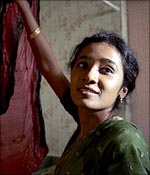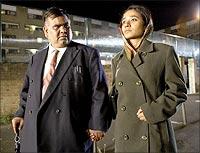|
|
| Help | |
| You are here: Rediff Home » India » Movies » Report |
|
 Tannishtha Chatterjee in Brick Lane | ||
| |||||||||||||||||||||||
|
| |||||||||||||||||||||||
Filmmaker Sarah Gavron grew up watching Hollywood's fantasy films, but never seriously thought about the filmmaking process. So years later, when Britain's Film4 asked her to direct Brick Lane, she approached her former teacher and now mentor, Stephen Frears, for advice.
It was a daunting task for Gavron. By now, she had worked on documentaries and also on a small made-for-television film, This Little Life, which won a BAFTA. But Brick Lane -- based on Monica Ali's Man Booker Prize finalist novel -- is about the Bangladeshi working class community in East London [Images] and Gavron felt unsure about taking on the challenge.
"Brick Lane was about a community that was outside my realm, based on an acclaimed novel with myriad of fans," she says, "Distilling the novel was daunting. Casting was very hard. It was deeply political to tell this story from the point of view of the marginalised voice of (Ali's protagonist) Nazneen.
"But Stephen said, 'Do it,'" Gavron recalls. "He really influenced me and was very helpful. It wasn't until I saw My Beautiful Launderette [Frears' landmark film based on Hanif Kureishi's screenplay], and films by Terence Davies and Ken Loach that I realised that you could make films about the world around you. And that inspired me. My Beautiful Launderette was a turning point in my life.
"The next leap was seeing the women, who were making films," she adds, mentioning names like Jane Campion, Gurinder Chadha and Mira Nair. "So it was kind of a gradual process."
 Gavron first met Frears -- whose other works include The Queen, Dirty Pretty Things and Sammy And Rosie Get Laid -- at London's National Film and Television Institute.
Gavron first met Frears -- whose other works include The Queen, Dirty Pretty Things and Sammy And Rosie Get Laid -- at London's National Film and Television Institute.
"At the film school, he was brutal as a teacher," she says. "He would come into the cutting room and yell, 'This is rubbish. I am not seeing anything interesting.' And he would uncover all of your mistakes. He is a man of few but very strong words."
But the friendship continued. And just as Frears took the leap in the mid-1980s to understand the Pakistani community to direct My Beautiful Launderette and Sammy And Rosie Get Laid, Gavron walked into the lives of Bangladeshis in East London.
After a successful run at international film festivals and in theatres in Britain, Gavron's Brick Lane opens in New York and Los Angeles on June 20. It will then open in other major cities across the US.
Casting Brick Lane was one of biggest challenges, Gavron says. For the role of Nazneen -- who we first meet as a 17-year-old bride, sent off in an arranged marriage deal to London with a man, who is 20 years older to her -- Gavron and her team searched all over South Asia, including Bangladesh, until they finally hired Indian actress Tannishtha Chatterjee in Mumbai.
"She physically fit the role," Gavron says about Chatterjee. "She is not Bangladeshi, but she is Bengali, and she understood the culture and the language. But more important, she is very instinctive and intelligent to work with. You have to watch her throughout the film and she had this quality. She understood these tiny emotional shifts."
Finding an actor to play Nazneen's husband Chanu was a far bigger challenge.
"We spent eight months searching for Chanu and I was at my wits' end," Gavron says. "We were three weeks from shooting and I had tried Tannishtha with every man and I was about to cast someone who was wrong, the pressure of filmmaking being such."
Then a casting agent suggested the name of character actor and director, Satish Kaushik. "I remember thinking it was too late," she recalls. "He looked interesting. When I asked Tannishtha, she said she had watched him play Willie Lohman in Death Of A Salesman. And that really intrigued me since that is a role connected to Chanu."
 So the team flew to New Delhi to meet Kaushik and Gavron auditioned him with Tannishtha. "He took us to his restaurant, called Khana Unlimited, and it was so interesting because he is so successful in real life [as compared to Chanu]," Gavron says.
So the team flew to New Delhi to meet Kaushik and Gavron auditioned him with Tannishtha. "He took us to his restaurant, called Khana Unlimited, and it was so interesting because he is so successful in real life [as compared to Chanu]," Gavron says.
As many critics have pointed out, while Tannishtha glows in the role of Nazneen, the real surprise is Kaushik, who makes the often unbearable Chanu, quite likeable. He is an odious character and sometimes insufferable, and yet Kaushik's Chanu grows on you in the film.
"I felt it was so important that this character was a complex and multi-faceted guy," Gavron says. "He could be didactic and difficult, but also warm, sympathetic and wise. And to think that he doesn't essentially change but we change our perspective on him. So all of those qualities are there but we are also seeing them through the eyes of Nazneen, as he grows in stature.
"It was always a fine balance and we were constantly saying that this is a Chanu show," she adds. "But Satish is one of those very sympathetic actors. So even in one of his worst moments, he could make it work."
Gavron also thinks that the credit for Chanu should go to Ali's writing. "Monica knew the character inside out. Until the end, you do not completely hate him and I sort of fell in love with him in the novel. He is a sort of a gift really."
That takes Gavron to the final challenge of making Brick Lane. Ali was a very hands-off writer, who did not get involved in the casting or the shooting process. Ali's response to the invitations by Gavron and her team was a quote from John Fowels, where the author had said that having his book turned into a film was like watching an oxen turned into bullion cubes.
Finally, when the film was in a rough edit form, Gavron insisted that Ali should watch the cut. "And she came and I had this nail-biting experience," Gavron recalls. "I wandered around SOHO, but then I finally went inside the screening theatre. She was silent for a while and then she said, 'I really think you have captured the essence of the book. It was a pleasure to watch my characters walk out of the pages of the book.' And from that moment, she became very supportive."
|
|
| © 2008 Rediff.com India Limited. All Rights Reserved. Disclaimer | Feedback |